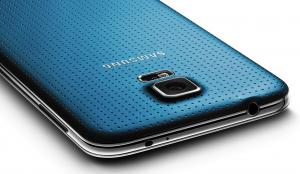NXP Wins Back NFC Controller Business for Samsung Flagship But Misses on Embedded Chip

NFC Times Exclusive: Samsung Electronics has switched back to an NFC controller chip from NXP Semiconductors for most of the planned shipments of its new flagship, the Galaxy S5, but the phones will not pack NXP’s embedded secure element, NFC Times has learned.
Samsung, which unveiled the Galaxy S5 last week for planned release in April, chose NXP’s highly regarded PN547 NFC radio chip over one from U.S.-based Broadcom, which supplied the Galaxy S4 with NFC technology.
But NXP’s new large memory embedded chip was not ready in time to be stacked with its NFC controller. And this–combined with continued pressure from telcos to stop offering the embedded chip, in addition to the advent of host-card emulation, among other issues–caused Samsung to decide to do without the secure element in most Galaxy S5 shipments, sources told NFC Times.
That is a big shift from the Galaxy S4, which is believed to have carried an embedded secure element in every phone shipped globally, though mobile operators, such as those making up the Isis joint venture, ordered Samsung to deactivate the chip in phones shipped to them. The embedded secure element in the Galaxy S4, from Oberthur Technologies, using an STMicroelectronics chip, was paired with Broadcom’s NFC controller.
For the Galaxy S5, Samsung plans to include an embedded chip in selected markets, but sources say these will likely be few in number–only those where banks or other issuers have already introduced payment on embedded chips or are in the process of doing so. For these devices, Samsung will use the older NFC chip combination from the Galaxy S4–supplied by Broadcom and Oberthur, sources said.
Overall, the move by Samsung to greatly reduce the footprint of embedded chips in its flagship smartphone casts doubt on Samsung’s strategy to offer banks and other issuers an alternative to NFC SIMs–which was to be targeted in markets where most smartphones are sold on the open market. It also calls into question the viability of the embedded chip as an option for mass-market rollouts.
The new phone will run Android 4.4, so will support host-card emualtion as a default feature. But this is not the main reason most Galaxy S5s will not pack an embedded chip, sources said.
Words:
2,000
Graphics:
Major design wins: Broadcom vs. NXP
NXP's NFC controller shipments, 2011-2013
Among Topics Covered:
- Inside story about selection of NFC technology for the Samsung Galaxy S5
- Possible impact of NFC chip configuration in Galaxy S5 on Samsung’s embedded chip strategy.
- How the absence of embedded chips in the GS5 will affect total shipments of embedded secure elements in 2014
- Two markets where Samsung is definitely expected to offer the GS5 with embedded chips
- Figures on global NFC SIM shipments in 2012, 2013 and projection for 2014
- Details of telcos blocking Samsung embedded chips
- Issues affecting readiness of NXP’s new embedded chip
- Problems with Broadcom’s NFC controller
- Samsung's overtures to Oberthur
Among companies and organizations mentioned:
Samsung Electronics
NXP Semiconductors
Broadcom
Oberthur Technologies
Google
Isis
This is premium content from NFC Times.












